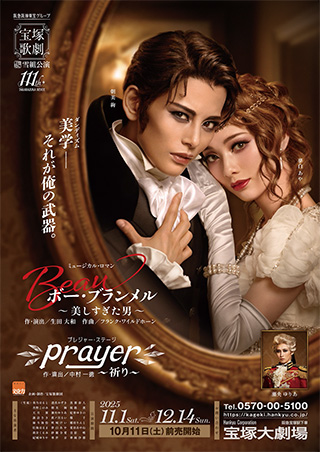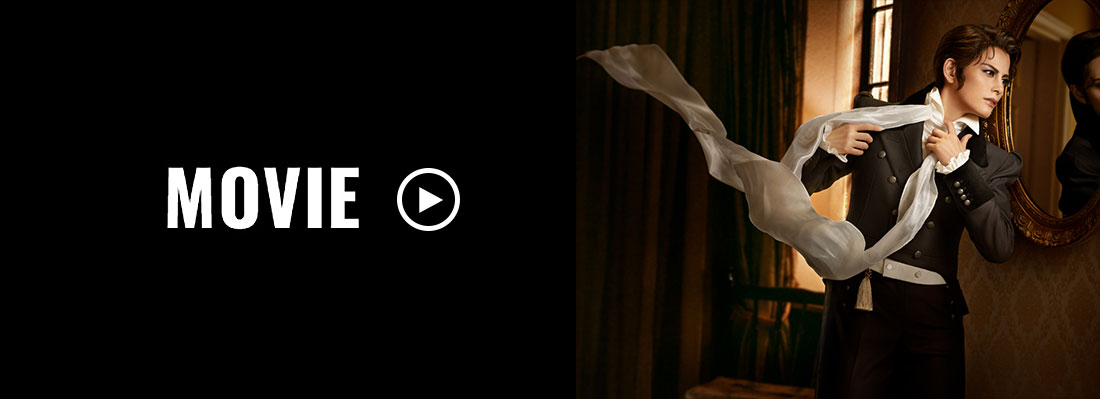![]()


“Beau Brummell-A Man Too Beautiful-”
Written and directed by Hirokazu Ikuta“Prayer”
Written and directed by Kazunori Nakamura

![]()
“Beau Brummell-A Man Too Beautiful-”
The time is the late 18th century. Beau Brummell suddenly appears in the top echelons of British society, gripping its attention. He has a sophisticated sense of both beauty and fashion, and quickly becomes a topic of conversation among the aristocrats. Rumors eventually reach the Prince of Wales, heir to the British throne. One evening, Beau shows up at a ball held by the Duchess of Devonshire, and the prince finds himself captivated by the younger man’s remarkable beauty and aesthetic sense, as well as his tendency towards a haughty demeanor. The enthralled prince introduces Beau to his mistress, actress Harriette Robinson, as his favorite “object of beauty.” At the encouragement of the prince, Harriette hesitantly takes Beau’s hand and they begin to dance. Unbeknownst to anyone, Harriette and Beau share an enormous secret.
The real name of Beau Brummell, this extraordinary new member of high society, is George Brian Brummell. His father was William Brummell, a very lucky man who had an enduring obsession with the lives of the upper classes, a lifestyle on the other side of a wall he knew he ─ a commoner ─ could never surmount. This obsession became a curse that gnawed away at both father and son, with William tormenting his son from childhood. The accomplished young George made it into the elite Oxford University, but was unable to blend in with his aloof classmates from the aristocracy. Instead, George frequented gambling halls and theaters on the wrong side of town. This is where he met Harriette Robinson, a rising young actress, and found in her a kindred spirit. The two fell in love and spent happy days together.
However, when William died and left his estate to his son, George was seized by the warped ambition of getting revenge on his father, who continued to torment his son until his death, by using his inheritance to obtain status in high-class society, something the older man had never succeeded at. To achieve his ambition, George threw away his entire identity: his humble upbringing, his true personality and the woman he loved. He aimed to use his taste and aesthetic sense as weapons to work his way up to the pinnacle of society as Beau Brummell, a character of his own creation. In the meantime, Harriette had first believed that George, who so suddenly disappeared from her life, would someday come back, but eventually, grieved at the loss of her love, went from man to man, until she found herself aiming for the top. Thus she found favor with the prince and succeeded in becoming an actress on the stage of the Drury Lane Theater, owned by the prince.
With the trust of the prince, Beau establishes “dandyism” in upper-class society. Harriette, for her part, becomes a successful actress under the protection of the prince. The former lovers, though, are living false lives until they are accidentally reunited. Here in the aristocratic society, they realize that they can return to their true selves when they are together. As Beau and Harriette begin to meet in secret, the flames of love are reignited. Beau appears to have achieved everything he hoped to, but destiny is about to interfere.
“Prayer”
Since ancient times, people have offered prayers for peace, happiness, hope, dreams, and love—and at times, they offer it in gratitude. These prayers eventually take the form of song, dance, and movement, and through them, they have become the reason to live for tomorrow throughout the course of human history.
Beginning with a prologue that evokes the descent of a great deity in response to prayers from around the world, this fantastical and celebratory revue offers a “prayer” through songs and dance scenes bursting with heartfelt wishes, joy, and blessings. Encompassing the spirit of celebration and hope, this show expresses a deep desire for happiness for all people and the world.
![]()
“Beau Brummell-A Man Too Beautiful-”
Beau Brummell:
Harriette Robinson:
Aya Yumeshiro
Prince of Wales:
Charles James Fox:
Lord Yarmouth:
Jean Scott (Tory Party member):
Lady Yarmouth:
Konomi Anno
Antoine Carême:
Meyer:
Marchioness Soulberry:
William Brummell:
Richard Sheridan:
Henry Pierpont:
John Nash:
John Wilson Croker (Tory Party member):
Lawrence:
Nicholas Vansittart (Tory Party member):
Countess Blueberry:
Baroness Salisberry:
Kurumi Rina
Davidson:
Lord Alvanley:
Little George:
Ayer:
Viscountess Strawberry:
Lumley Skeffington:
Cuyer:
Caroline, Princess of Wales:
Mildmay:
Marchioness Raspberry:
Dream of Rococo:
Sayer:
Tyer:
Countess Blackberry:
Nyer:
Robert Jenkinson:
Duchess Devonshire:
Dream of Rococo:
Dream of Rococo:
Baroness Cranberry:
Pritchard (Butler of the Devonshire Household):
Charlotte Barry:
Hyer:
Henry Addington (Tory Party member):
Dream of Rococo:
Arthur Wellesley (Tory Party member):
Viscountess Bilberry:
Dream of Rococo:
Dream of Rococo:
Dream of Rococo:
Dream of Rococo: